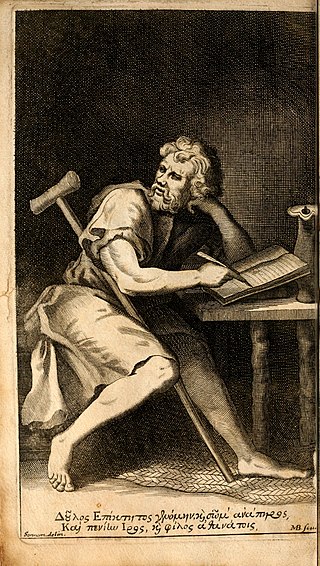
Epictetus was a Greek Stoic philosopher. He was born into slavery at Hierapolis, Phrygia and lived in Rome until his banishment, when he went to Nicopolis in northwestern Greece for the rest of his life. His teachings were written down and published by his pupil Arrian in his Discourses and Enchiridion.

The Enchiridion or Handbook of Epictetus is a short manual of Stoic ethical advice compiled by Arrian, a 2nd-century disciple of the Greek philosopher Epictetus. Although the content is mostly derived from the Discourses of Epictetus, it is not a summary of the Discourses but rather a compilation of practical precepts. Eschewing metaphysics, Arrian focuses his attention on Epictetus's work applying philosophy to daily life. Thus, the book is a manual to show the way to achieve mental freedom and happiness in all circumstances.

Jean-Jacques Rousseau was a Genevan philosopher, writer, and composer. His political philosophy influenced the progress of the Age of Enlightenment throughout Europe, as well as aspects of the French Revolution and the development of modern political, economic, and educational thought.

Jalāl al-Dīn Muḥammad Rūmī, also known as Jalāl al-Dīn Muḥammad Balkhī, Mevlânâ/Mawlānā and Mevlevî/Mawlawī, but more popularly known simply as Rumi, was a 13th-century Persian poet, Hanafi faqih, Islamic scholar, Maturidi theologian and Sufi mystic originally from Greater Khorasan in Greater Iran. Rumi's influence transcends national borders and ethnic divisions: Iranians, Tajiks, Turks, Greeks, Pashtuns, other Central Asian Muslims, as well as Muslims of the Indian subcontinent have greatly appreciated his spiritual legacy for the past seven centuries. His poems have been widely translated into many of the world's languages and transposed into various formats. Rumi has been described as the "most popular poet" and the "best selling poet" in the United States.

Meher Baba was an Indian spiritual master who said he was the Avatar, or God in human form, of the age. A major spiritual figure of the 20th century, he had a following of hundreds of thousands of people, mostly in India, but with a significant number in the United States, Europe and Australia.
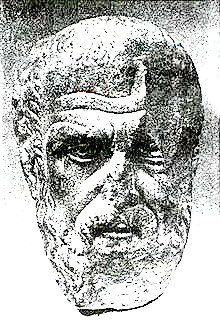
Arrian of Nicomedia was a Greek historian, public servant, military commander and philosopher of the Roman period.
Emil or Emile may refer to:
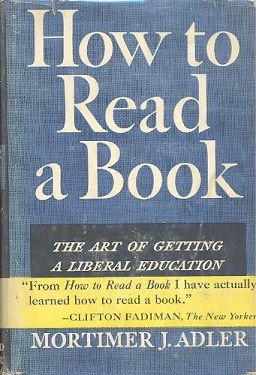
How to Read a Book is a book by the American philosopher Mortimer J. Adler. Originally published in 1940, it was heavily revised for a 1972 edition, co-authored by Adler with editor Charles Van Doren. The 1972 revision gives guidelines for critically reading good and great books of any tradition. In addition, it deals with genres, as well as inspectional and syntopical reading.

Discourse on the Origin and Basis of Inequality Among Men, also commonly known as the "Second Discourse", is a 1755 work by philosopher Jean-Jacques Rousseau.

Emile, or On Education is a treatise on the nature of education and on the nature of man written by Jean-Jacques Rousseau, who considered it to be the "best and most important" of all his writings. Due to a section of the book entitled "Profession of Faith of the Savoyard Vicar", Emile was banned in Paris and Geneva and was publicly burned in 1762, the year of its first publication. During the French Revolution, Emile served as the inspiration for what became a new national system of education.

The Social Contract, originally published as On the Social Contract; or, Principles of Political Right, is a 1762 French-language book by the Genevan philosopher Jean-Jacques Rousseau. The book theorizes about the best way to establish a political community in the face of the problems of commercial society, which Rousseau had already identified in his Discourse on Inequality (1755).
Daniel Ladinsky is an American poet and interpreter of mystical poetry, born and raised in St. Louis, Missouri. Over a twenty-year period, beginning in 1978, he spent extensive time in a spiritual community at Meherabad, in western India, where he worked in a rural clinic free to the poor, and lived with the intimate disciples and family of Meher Baba.

Action Philosophers! was a self-published comic book series by artist Ryan Dunlavey and writer Fred Van Lente, which was awarded a Xeric Grant in 2004, leading to Action Philosophers! # 1's publication in April 2005.
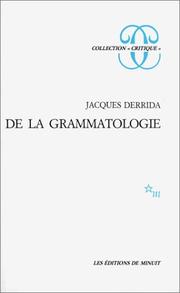
Of Grammatology is a 1967 book by the French philosopher Jacques Derrida. The book, originating the idea of deconstruction, proposes that throughout continental philosophy, especially as philosophers engaged with linguistic and semiotic ideas, writing has been erroneously considered as derivative from speech, making it a "fall" from the real "full presence" of speech and the independent act of writing.
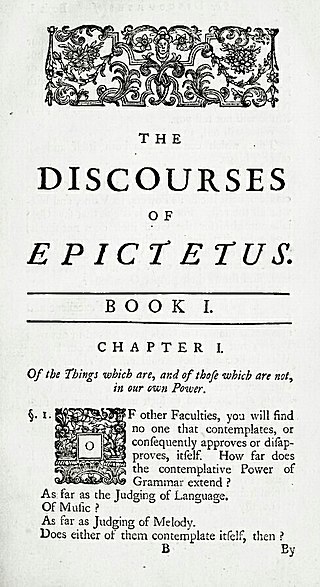
The Discourses of Epictetus are a series of informal lectures by the Stoic philosopher Epictetus written down by his pupil Arrian around 108 AD. Four books out of an original eight are still extant. The philosophy of Epictetus is intensely practical. He directs his students to focus attention on their opinions, anxieties, passions, and desires, so that "they may never fail to get what they desire, nor fall into what they avoid." True education lies in learning to distinguish what is our own from what does not belong to us, and in learning to correctly assent or dissent to external impressions. The purpose of his teaching was to make people free and happy.
Panthoides was a dialectician and philosopher of the Megarian school. He concerned himself with "the logical part of philosophy", and at some point taught the Peripatetic philosopher Lyco of Troas. He wrote a book called On Ambiguities, against which the Stoic philosopher Chrysippus wrote a treatise.

Stoicism is a school of Hellenistic philosophy founded by Zeno of Citium in Athens in the early 3rd century BCE. It is a philosophy of personal virtue ethics informed by its system of logic and its views on the natural world, asserting that the practice of virtue is both necessary and sufficient to achieve eudaimonia : one flourishes by living an ethical life. The Stoics identified the path to eudaimonia with a life spent practicing the cardinal virtues and living in accordance with nature.
Essay on the Origin of Languages is an essay by Jean-Jacques Rousseau published posthumously in 1781. Rousseau had meant to publish the essay in a short volume which was also to include essays On Theatrical Imitation and The Levite of Ephraim. In the preface to this would-be volume, Rousseau wrote that the Essay was originally meant to be included in the Discourse on Inequality, but was omitted because it "was too long and out of place". The essay was mentioned in Rousseau's 1762 book, Emile, or On Education.

The Fihi Ma Fihi, "It Is What It Is" or "In It What Is in It") is a Persian prose work of a famous 13th century writer, Rumi. The book has 72 short discourses.
Jacques Rousseau may refer to:














